Shortages: Fish on the slide
- Published
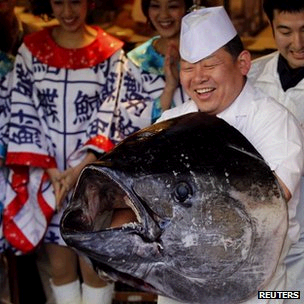
Bluefin tuna are top of many people's eating lists
In the first of a series of five essays on declining global resources, the BBC's Environment Analyst Roger Harrabin looks at the depletion of fish stocks.
The sea exemplifies the world's on-going failure to govern shared natural resources.
There's widespread agreement among nations on the need to conserve fish stocks but often disagreement on the details of how to do it.
And the need for unanimity in the UN process consistently allows a handful of countries to put the short-term interests of fishing crews before the fish stocks themselves.
It all means that globally <link> <caption>about 85% of stocks</caption> <url href="http://cfp-reformwatch.eu/2011/01/un-report-overexploitation-of-fish-stocks-continues/" platform="highweb"/> </link> are said to be fully exploited, over-exploited, depleted or slowly recovering.
Through the lens of history the depletion of fisheries looks even worse.
Using data from 1889, researchers assessed catches of bottom-feeding fish like cod, plaice and sole in England and Wales.
They calculated that over 118 years of industrial fishing, the <link> <caption>productivity of this fishery dropped by 94%</caption> <url href="http://www.nature.com/ncomms/journal/v1/n2/full/ncomms1013.html" platform="highweb"/> </link> . Not to 94% but by 94%.
Anyone with a snorkel and mask - and a tolerance to cold water - can attest that much of the sea bed resembles a desert.
The year of Peak Ocean Fish was 1996. Crews hauled in 87.7 million tonnes of wriggling protein.
The total sea catch has since <link> <caption>fallen to about 80 million tonnes and stabilised</caption> <url href="http://www.fao.org/docrep/015/i2389e/i2389e.pdf" platform="highweb"/> </link> .
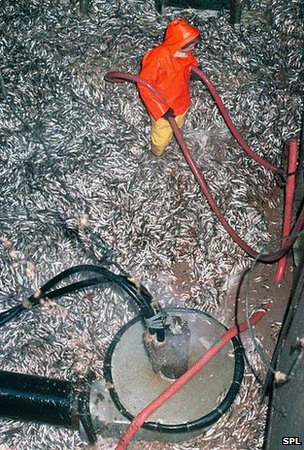
Industrial scale fishing has depleted the species we love the best
But we're depleting the species we like best and making up the difference in low value substitutes.
Tuna, the world's favourite, has declined in the Atlantic since 1993.
Catches of cod in the North-East Atlantic have been tumbling since the late 1960s.
The total catch is being deceptively bolstered by unloved species like blue whiting and sandeels.
Meanwhile fishermen are hunting farther from home for new favourites, using methods like bottom trawling where the ocean floor is scraped clean of life, and long-lining where hooks strung off lines often haul in by-catch that beggars comprehension.
Take the longline fishery for mahi mahi in Costa Rica. Its collateral damage over a decade included 402 silky sharks, 625 stingrays and 1348 olive ridley turtles.
Turtles of course eat jellyfish, <link> <caption>an increasing scourge of the seas</caption> <url href="http://www.nceas.ucsb.edu/~baum/Julias_NCEAS_Website/home_files/Whoriskeyetal2011_inpress.pdf" platform="highweb"/> </link> .
In some areas nine out of ten large sharks have been killed. Callum Roberts, author of the excellent "Ocean of Life", says we're tugging blindly at the web of life in the sea.
Big sharks eat cownose rays and, without their predators, the rays in US waters have been free to gorge on the scallops that adorn the tables of top restaurants.
Fishermen are now muscling into the icy waters of the Southern Ocean in an increasingly desperate search for new stocks to feed a world population that's growing and getting richer.
And our impact on fish stocks isn't just through nets and lines.
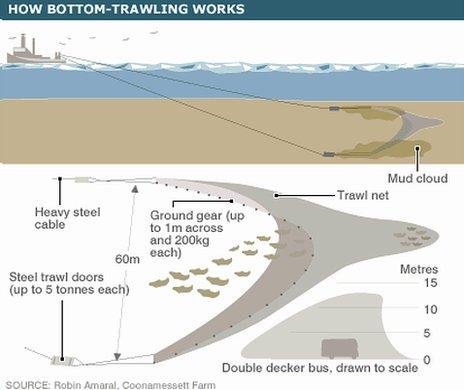
Many of the world's great rivers <link> <caption>carry so much nutrient run-off</caption> <url href="http://www.un.org/News/Press/docs/2004/envdev758.doc.htm" platform="highweb"/> </link> from farms that the seas by the river mouths are virtually biologically dead.
The coral reefs and mangroves which serve as nurseries for fish in the tropics are being eroded by development, pollution and silt.
Predator fish accumulate man-made chemicals in their bodies passed up through the food chain - polychlorinated biphenyls, flame retardants, endocrine disrupters.
Fish distribution is being changed as the ocean warms with human-induced climate change.
And the CO2 emissions that warm the planet are also dissolving into the ocean and making it less alkaline - acid ocean syndrome. The change is chemically minuscule but historically huge.
There's much uncertainty how sealife will react but some scientists forecast that coral reefs in their current form won't survive. Studies suggest that pteropods - tiny swimming snails - <link> <caption>will be badly hit</caption> <url href="http://www.biogeosciences.net/9/309/2012/bg-9-309-2012.pdf" platform="highweb"/> </link> because they need alkaline water to make their shells.
That could matter to us because pteropods feed the salmon, herring, mackerel and cod that we like to eat.
WWF animation showing how fishing has expanded since 1950
But the picture is not totally bleak. The first Rio Earth Summit in 1992 <link> <caption>called for nations to find ways to conserve fish stocks</caption> <url href="http://www.un.org/ecosocdev/geninfo/sustdev/fishery.htm" platform="highweb"/> </link> and prevent international conflicts over fishing on the high seas.
There's been some limited progress since then.
The <link> <caption>US announced recently</caption> <url href="http://www.nmfs.noaa.gov/mediacenter/2012/05/05-30-12%20Lubchenco-Damanaki%20Statement.pdf" platform="highweb"/> </link> that a record six populations of fish in its waters returned to healthy levels in 2011, thanks to controversial limits imposed on angry fishermen. The restrictions have resurrected 27 fish stocks in the last 11 years. And 79% of the fish populations assessed are no longer over-fished.
Fishing crews are pushing for the limits to be relaxed but the National Oceanic and Atmospheric Administration (Noaa) insists on a precautionary approach. It's much easier when you have just one government, of course - very different from the perpetual squabble of the EU Common Fisheries Policy.
Protected area
Marine Protected Zones are another advance in recent years. President George W Bush has banned fishing in an area the size of Spain in US-controlled waters of the central Pacific.
The British government trumped him by <link> <caption>creating the world's biggest single marine reserve</caption> <url href="http://news.bbc.co.uk/1/hi/8599125.stm" platform="highweb"/> </link> round the Chagos islands in the Indian Ocean - all 545,000 sq km of it. Last week, Australia announced that it would create the largest network of marine reserves yet.
The waters off British-controlled South Georgia in the south Atlantic might be next. Fiji wants 30% of its waters protected and European nations including the UK are slowly imposing their own marine protected zones, prompted by the UN Convention on Biodiversity (CBD) which was initiated at Rio.
In an example of institutional inventiveness, six protected areas have been created in the North Atlantic by nations under the auspices of the Ospar convention which was created to govern issues like pollution and oil drilling, not fisheries.
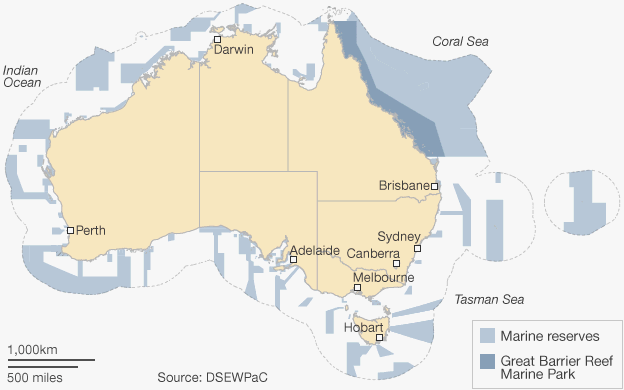
But timetables on protected zones have been sliding away. Most recently nations agreed under the CBD to safeguard 10% of seas by 2020. Currently the total is just over 1%.
The issue - like most fishy issues - is complicated as some mobile species <link> <caption>will need moveable protected zones</caption> <url href="http://www.bbc.co.uk/news/science-environment-17070993" platform="highweb"/> </link> .
Then the zones will have to be enforced. Maybe pirate fishermen will be spotted in future by drone aircraft or boats but nations will still need to fund patrol boats to arrest fish thieves.
As the struggle in the seas continues, aquaculture will help to keep fish on our plates. Of the fish we eat 25% are now farmed; in China it's 80%.
There are many problems with industrial scale fish farming though. One is that carnivorous fish like salmon eat several times their weight in other fish, which then have to be caught.
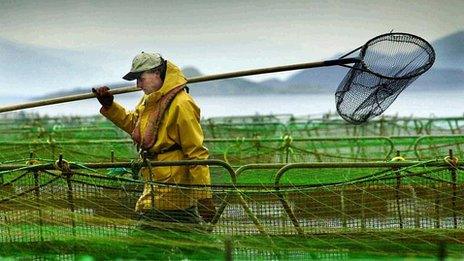
Fish farms: Salmon eat more than their weight in other fish
If you feed salmon a vegetarian diet they don't produce the omega 3 oils we value. Biologists are now working to synthesise omega 3 oils to keep farmed salmon tasting like salmon.
That problem doesn't apply to vegetarian fish like tilapia and carp - and they have <link> <caption>helped the per-capita supply of fish</caption> <url href="http://www.fao.org/docrep/013/i1820e/i1820e.pdf" platform="highweb"/> </link> for humans to reach an all-time high.
Meanwhile, though the plunder of the oceans for wild fish goes on.
One outcome from the second Rio Earth Summit would be some new declaration on protecting the seas. But UN declarations can only do so much, and it'll take much more than words to bring the oceans back to health.
- Published6 June 2012
- Published27 January 2012
- Published28 May 2012
- Published19 November 2011